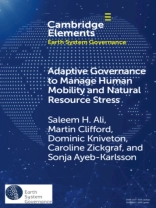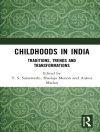Connections between resources and migration operate as a complex adaptive system rather than being premised in linear, causal mechanisms. The systems thinking advocated within this Element increases the inclusion of socio-psychological, financial, demographic, environmental and political dimensions that mediate resource-(im)mobility pathways. The Earth Systems Governance paradigm provides a way to manage global migration flows more effectively, allowing for consideration of networks and interdependencies in addition to its inherent adaptiveness. Resource rushes, hydropower displacement, and climate-induced retreat from coastal areas are all examples of circumstances linking resources and human mobility. Movement can also ameliorate environmental conditions and hence close monitoring of impacts and policies which harness benefits of migration is advocated. Green remittance bonds, and land tenure policies favoring better arable resource usage are key ingredients of a more systems-oriented approach to managing mobility. The Global Compact on Migration offers an opportunity to operationalize such adaptive governance approaches in the Anthropocene.
Saleem H. Ali & Sonja Ayeb-Karlsson
Adaptive Governance to Manage Human Mobility and Natural Resource Stress [EPUB ebook]
Adaptive Governance to Manage Human Mobility and Natural Resource Stress [EPUB ebook]
¡Compre este libro electrónico y obtenga 1 más GRATIS!
Formato EPUB ● ISBN 9781009357715 ● Editorial Cambridge University Press ● Publicado 2023 ● Descargable 3 veces ● Divisa EUR ● ID 8819059 ● Protección de copia Adobe DRM
Requiere lector de ebook con capacidad DRM












